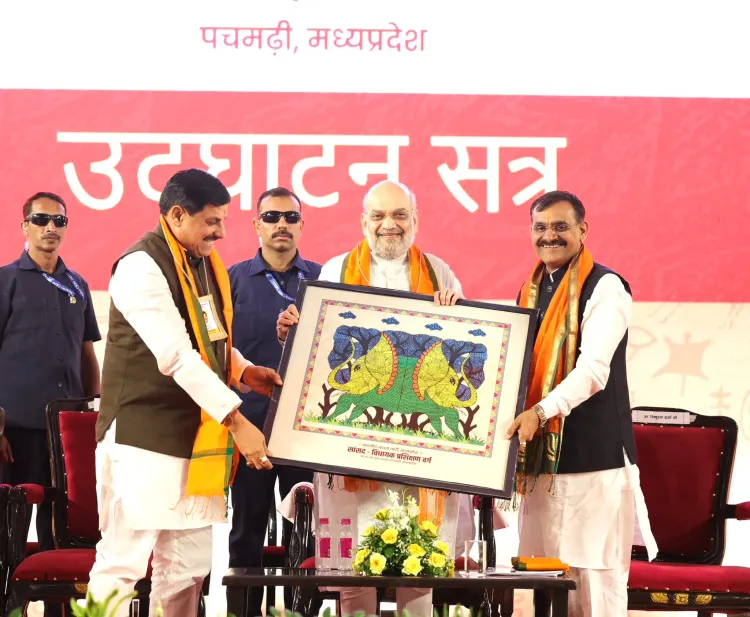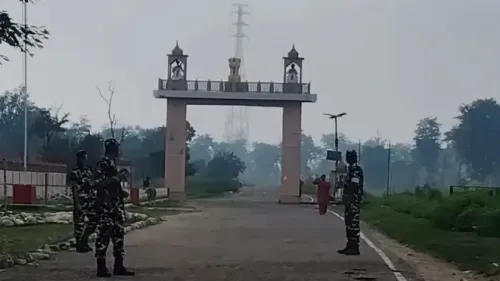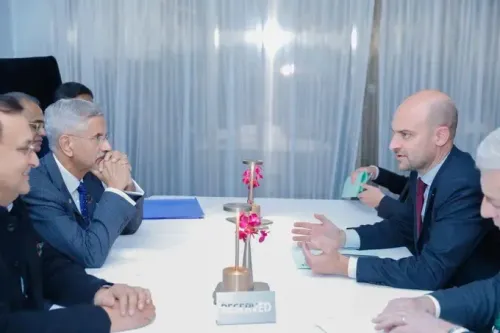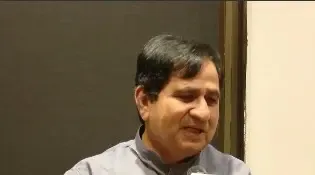Will Any Threat to India's Sovereignty Face Decisive Action?

Synopsis
Key Takeaways
- National security is a priority for India.
- Any threats to India’s sovereignty will face decisive action.
- Over 26 crore people lifted out of poverty in the last 11 years.
- The BJP emphasizes ideological consistency and national service.
- The party has grown from 11 members to over 11 crore.
Pachmarhi (Madhya Pradesh), June 15 (NationPress) - Union Home Minister Amit Shah emphasized on Saturday that national security is paramount, asserting that any actions that threaten India’s sovereignty will encounter decisive action. He reiterated the government’s unwavering commitment to safeguarding the nation’s interests and highlighted the crucial role of discipline, ideological dedication, and public service in steering the future of both the party and the nation.
Speaking at the Bharatiya Janata Party’s MP-MLA Training Camp held in the picturesque hill station of Pachmarhi, Madhya Pradesh, HM Shah commenced his address by honoring former Gujarat Chief Minister Vijaybhai Rupani and others who tragically lost their lives in a plane crash in Ahmedabad.
He paid tribute to Late Rupani’s contributions to the party and the country, emphasizing the BJP’s ethos of selfless service and steadfast adherence to its principles. Reflecting on the party's legacy, Shah acknowledged the impactful roles of leaders such as Shyama Prasad Mukherjee, Pandit Deendayal Upadhyay, Atal Bihari Vajpayee, LK Advani, and Prime Minister Narendra Modi.
He affirmed that the BJP has consistently delivered leaders of remarkable integrity and commitment for India. Shah articulated a vision for a secure, developed, and thriving India, stating that the Modi administration has been actively working to realize this vision. Over the past 11 years, the government has successfully lifted 26 crore individuals out of poverty, provided essential amenities to seven crore families, and offered financial support to farmers.
HM Shah also discussed the party’s ideological consistency, noting that from its inception in the Jana Sangh to its current form, the BJP has remained true to its principles. He expressed confidence that the BJP’s influence will expand, ensuring its presence throughout the nation. The Home Minister urged party members to understand that the respect they garner is not personal, but rather a reflection of the party’s core values. He encouraged them to engage in lifelong learning and uphold the party’s mission of national service.
He recounted the BJP’s history, notably how Shyama Prasad Mukherjee resigned in protest against policies that clashed with India’s cultural heritage. His resignation, driven by opposition to the Nehru-Liaquat Pact, emphasized his commitment to ensuring the protection of Hindu minorities in Pakistan.
HM Shah remarked on the party's growth from a mere 11 members to over 11 crore members, highlighting that the BJP’s struggles have always been rooted in principles rather than mere electoral gains. He cited movements like the fight against Article 370 and the Ram Janmabhoomi movement as examples of this dedication. He concluded by reaffirming the BJP’s commitment to Antyodaya, the philosophy aimed at uplifting the marginalized sections of society.
He pointed out the transformation of states previously labeled as BIMARU—Bihar, Madhya Pradesh, Rajasthan, Uttar Pradesh, and Chhattisgarh—under BJP governance, showcasing the effectiveness of decentralized development. The training camp is set to continue with sessions aimed at enhancing leadership skills and reinforcing the party’s ideological foundation, thus preparing BJP representatives for future governance and electoral responsibilities.








